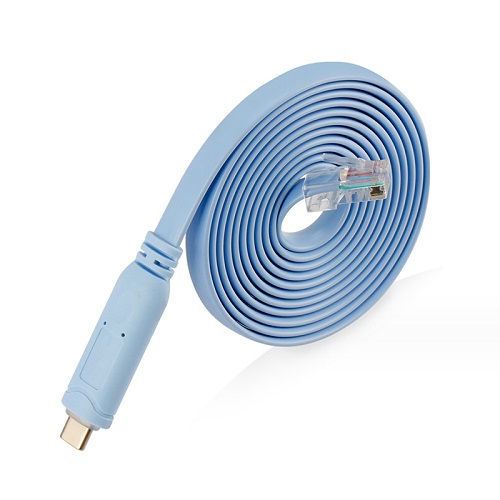As network attacks become increasingly frequent and sophisticaTed, network security becomes ever more critical. In this digital age, the console cable plays a vital role in network security. This article will delve into the crucial role of console cable in network security and provide relevant practical recommendations.

Protecting Devices from Remote Attacks
While remote management is a convenient way to administer network devices, remote interfaces also become targets for attackers. By directly connecting to the device's console port via a console cable, administrators can bypass the network and remain unaffected by remote attacks. This direct physical connection provides a secure means of management and enables swift response to security incidents when necessary.
Limiting Network Exposure Risks
Many network devices feature remote management capabilities, exposing them to risks of attack from the internet. Through the use of a console cable, administrators can connect directly to devices physically, bypassing the network. This approach significantly reduces the risks of network exposure, enhancing overall network security.
Emergency Response and Troubleshooting
Swift emergency response is crucial when network issues arise. By utilizing a console cable, administrators can quickly connect to the device's console for troubleshooting and repairs. This direct physical connection serves as a reliable backup communication method in the event of network failure or attack.
Secure Configuration Management
With a console cable, administrators can access the device's console interface directly for configuration management and auditing purposes. This direct physical connection eliminates security vulnerabilities associated with managing devices over the network, ensuring administrators can safely make configuration changes and monitor access to devices.
Practical Recommendations
Implement Access Controls: Restrict physical access to console cables and ensure only authorized personnel can use them to connect to devices.
Encrypt Data Transmission: Where possible, utilize console cables that support encrypted communication to safeguard data transmitted via the cable.
Regular Auditing and Monitoring: Regularly audit and monitor the usage of console cables, as well as activities conducted by connecting to devices via console cables, to identify and respond to potential security threats.
Training and Awareness: Provide training to administrators on secure usage and best practices concerning console cables, as well as how to recognize and respond to potential security threats.
Backup and Emergency Preparedness: Always back up critical device configurations and ensure quick restoration via console cable when necessary.
By understanding and implementing these practical recommendations, organizations can fully leverage the advantages of console cables and ensure they play a critical role in network security, protecting networks from threats and attacks.
FAQs about the Crucial Role of Console Cable in Network Security
Q: What is a console cable?
A: A console cable is a type of cable used to establish a direct physical connection between a computer or terminal and a networking device's console port. It enables administrators to access the device's command-line interface (CLI) for configuration, management, and troubleshooting purposes.
Q: How does a console cable enhance network security?
A: Console cables enhance network security by providing a direct, physical means of accessing and managing networking devices. This bypasses potential vulnerabilities associated with remote management interfaces, reducing the risk of remote attacks and unauthorized access.
Q: Can console cables be used for remote management?
A: No, console cables are typically used for local management, allowing administrators to connect directly to a device's console port. However, some advanced console servers or remote access solutions may incorporate console cable connectivity for remote management purposes.


